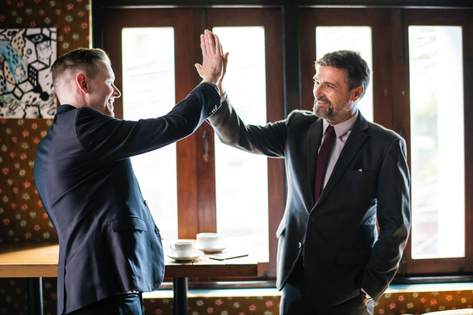 Research suggests that humor helps us build stronger bonds with each other, with links to greater satisfaction in the workplace. And although there may be times when spirited joke telling strikes the wrong note, a does of levity can be helpful in many situations. “Levity is a mind-set,” says Naomi Bagdonas, a lecturer at the Stanford Graduate School of Business, who advises executives on leading with humor and humanity. “It’s looking for reasons to be delighted rather than disappointed in the world around you.” Like any other skill, a sense of levity can be cultivated. Writing in The New York Times, Carolyn Todd offers suggestions from experts:
Learn more about creating a habit around masterful communication with our online learning courses awarded International Gold for Best Hybrid Learning of 2022.
0 Comments
 Defensiveness is a deterrent to productive communication. As soon as you get your hackles up, a new conversation begins — and this one is all about your reaction! The original topic is derailed. As Debra Roberts, interpersonal communication author, writes in Inc., we can easily spot defensive reactions in others, but it can be harder to spot them in ourselves. We all wear emotional armor and often feel threatened when it is pierced. Defensiveness is a form of self-protection that can present in many forms: Making excuses, ignoring or talking over the other person, criticizing the behavior of the other person, or becoming highly emotional. To curtail defensive reactions:
What do you typically do when you start to feel defensive? If its an over-reaction, do you think you can break the cycle? To join the conversation, click "comments" above. We would love to hear about your experiences! For more details on how to respond non-defensively to criticism, check out our BreakThrough Conflict curriculum. Create lifetime communication mastery online, with our virtual programs, awarded International Gold for Best Hybrid Learning of 2022.  These days there is plenty to argue about: Politics, health, money, even the climate. Some say we’re arguing too much; some say we’re not arguing enough. But the real problem is we are not arguing well. Bo Seo, a 28-year-old two-time world debating champion, says the problem of polarization stems from most arguments being “painful and useless… We spend more time vilifying, undermining and nullifying those who oppose us than we do trying to open or change their minds.” In his recent book, Good Arguments: How Debate Teaches Us to Listen and Be Heard, he argues that if more people took their cues from the world of competitive debate, it would be easier to get people to reconsider their views or at least consider those of others. Writing in The New York Times, columnist Pamela Paul outlines some of Seo’s key principles:
Do you think you could have done a better job during a recent argument? What might you have changed? To join the conversation, click "comments" above. We really want to hear about your experiences. Create lifetime communication mastery online, with our virtual courses, awarded International Gold for Best Hybrid Learning of 2022.  It's inevitable that at some point we will all be the targets of insults, admonishments, or negative feedback. We may be advised to “shake it off” but that’s not so easy. We tend to remember criticism more than we recall praise — due to a phenomenon called the “negativity bias.” This universal tendency for negative emotions to affect us more strongly than positive ones is evolutionary, in that it causes us to pay special attention to anything that might be a threat or put us in danger. According to Roy Baumeister, a social psychologist at the University of Queensland and co-author of The Power of Bad: And How to Overcome It, "Our ancestors who had that [negative] bias were more likely to survive.” However this tendency does not serve us very well on a daily basis. Baumeister believes that until we learn how to override the disproportionate impact of the negative, it distorts our view of the world. Of course, the impact of being criticized varies from person to person. But receiving and internalizing negative comments can increase stress, anxiety, frustration and worry, says Lucia Macchia, a behavioral scientist and visiting fellow at the London School of Economics. "Dealing with these negative emotions has a great impact on our body as they can even create and exacerbate physical pain," she adds. The good news: Scores of studies have shown that people tend to look on the bright side as they become older. Scientists refer to this effect as the "positivity bias" and they think we start to remember positive details more than negative information from middle age. Baumeister believes this is because we need to learn from failures and criticism in our younger years, but that need diminishes as we age. To reduce our negativity bias sooner, it helps to remember that our genetic programming could be at the root of our ruminating about criticism. Simply recognizing this negativity effect can help us override undesirable responses — and it can also be useful to remember that some criticism says more about the giver than the receiver. Have you ever given more credence to a criticism than it probably warranted? To join the conversation, click "comments" above. We would really like to hear about your experiences. Learn more about creating a habit around masterful communication with our online learning programs.  Romantic partnerships can be challenging in the best of times. And two years of pandemic togetherness have not made things easier for some. Writing in The New York Times, in an adaptation of that paper’s “Seven Day Love Challenge”, Tara Parker-Pope points out that even the strongest relationship can use an occasional tune-up. Among the strategies she suggests is practicing gratitude together. “Write down three things about your partner for which you feel grateful. Take a moment to read what you wrote about each other. Are you surprised about your partner’s feelings? Talk about these moments of gratitude and how they make you feel more connected to each other.” Showing gratitude on a daily basis is a common mindfulness practice proven to boost happiness, help us get better sleep and even reduce illness. And gratitude exercises can not only make us feel closer to our romantic partners, but also to our friends and co-workers. In general, people who express gratitude together are more satisfied in their relationships. So consider gratitude a “booster shot” for any relationship you want to keep healthy. When was the last time you shared feelings of gratitude with your partner, co-worker or friend? To join the conversation, click "comments" above. We would love to hear your feedback!  During conflict, it’s typical to move into a “flight or fight response.” Our brain is ‘hijacked’ by our amygdala, seat of fear and anxiety, and we may lose access to rational thinking. Our face may redden and our speech quicken — and because of “mirror neurons” the person to whom we are speaking may become agitated as well. However, writing in the Harvard Business Review, Amy Gallo, author of The HBR Guide to Dealing with Conflict, says, “It’s possible to interrupt this physical response, manage your emotions, and clear the way for a productive discussion.” Here are some tips for calming yourself down once you’ve gotten worked up:
How did you handle the last conversation you had when you were “worked up” and what do you wish you might have done differently? To join the conversation, click "comments" above (just below the picture). We would really like to hear your feedback.  Managers and leaders have a direct effect on their employees’ stress levels, but too few leaders are aware of this power. Even well-meaning managers may unwittingly stoke anxiety. Writing in the Harvard Business Review, Tomas Chamorro-Premuzic, professor of business psychology at Columbia University and an associate at Harvard’s Entrepreneurial Finance Lab, points out five behaviors that can increase people’s anxiety levels. Leaders who can spot these behaviors can start to change them.
Learn more about creating a habit around masterful communication with our online learning programs .  Overwhelmed by email? Join the club. One recent survey suggested the average American’s inbox has 199 unread messages (https://bit.ly/2XBZNpW). But ignoring email from co-workers communicates that their priorities are unimportant to you. And when researchers compiled a huge database of the digital habits of teams at Microsoft, they found that the clearest warning sign of an ineffective manager was being slow to answer emails (https://bit.ly/2s4t64D). Responding in a timely manner shows that you are conscientious, organized, and dependable. But, of course, not every single email deserves a reply, Writing in The New York Times, organizational psychologist Adam Grant offers some guidelines to help prioritize:
“Whatever boundaries you choose,” writes Grant, “don’t abandon your inbox altogether. Not answering emails is like refusing to take phone calls in the 1990s or ignoring letters in the 1950s.” How do you prioritize when you are inundated with emails? To join the conversation, click "comments" above. If you would like to learn more about creating a habit around masterful communication, check out our online learning programs.  Psychologists and neuroscientists have been studying eye contact for decades and their research reveals much about its power—for example that we make assumptions about other people based on how much they meet our eyes or look away when we are talking to them. Dr. Christian Jarrett, editor of the British Psychological Society's Research Digest blog, curated some of the most intriguing recent findings (https://bbc.in/2sfUsWL):
Of course, too much eye contact can make people uncomfortable – and individuals who stare without letting go can be unsettling. In one study, psychologists tried to establish the preferred length of eye contact. They concluded that, on average, it is three seconds long—and no one preferred gazes that lasted longer than nine seconds (https://bit.ly/2N4usXL). Eye contact is multi-dimensional. When we gaze into another’s eyes, we are subliminally decoding messages from their eye muscles (which reveal emotion), the dilation of their pupils, and even the limbal rings (the circles that surround the irises). “When you look another person in the eye,” says Dr. Jarred, “just think: it is perhaps the closest you will come to ‘touching brains’ – or touching souls if you like to be more poetic about these things.” Have you ever noticed that you respond differently to people who make eye contact versus those who habitually look away? To join the conversation, click "comments" above. If you would like to learn more about creating a habit around masterful communication, check out our online learning programs.  New York Times columnist David Brooks thinks Americans desperately need to find ways to be “less beastly” to one another—especially when negotiating disagreements. He recently researched and compiled some advice to promote cordiality and, yes, even kindness. Among his tips that resonate with our body of work:
What strategies do you use when negotiating in a contentious situation? To join the conversation, click "comments" above. If you would like to learn more about creating a habit around masterful communication, check out our online learning programs.  Being praised for a job well done can boost our brain with a feel-good surge and help us accomplish more (https://bit.ly/2DsinLa). But for many of us, accepting a compliment can feel awkward. Research shows that we tend to dwell on failures more than compliments (https://bit.ly/2BVmxIk). Perhaps there is survival value in this, says Dr Kristin Neff, an educational psychologist at the University of Texas, Austin. According to Dr. Neff, “ancestors who were negative worrywarts were more likely to survive.” Compounding our squeamishness in the face of compliments is: 1) we don't want to seem like we’re egotistical or arrogant; and 2) our skills may come so naturally to us that we underestimate their value. (Tweet it!) But compliments can be rich sources of information, giving us valuable feedback, and they have the capacity to create stronger relationships. So how can we accept complements graciously? Keep it short and positive with no self-deprecating comments. Try responses like: “Thank you, I’m glad you said that,” or “I appreciate your noticing,” or “Thanks for letting me know.” If you’re still afraid of looking swellheaded, or if you’re genuinely interested in more input, ask a follow-up question to show you value the compliment giver’s opinion and acknowledge there’s always room for improvement (https://nyti.ms/2rwoWnb), How did you respond the last time someone paid you a compliment? Did you try to deflect it, or did you accept it? Were you successful, and how did you do it? To join the conversation, click "comments" above. If you would like to learn more about creating a habit around masterful communication, check out our online learning programs.  This New Year, consider making a resolution to practice 12 months of conscious, healthy communication. Most people navigate through important moments of communication on automatic pilot, reacting from emotion rather than intention (Tweet it!). But we can transform our relationships by getting off autopilot and being proactive with positive communication. As communication researchers and partners in work and marriage for decades, we’ve experienced both the joy and challenge of personal and business communication and we’ve found some simple steps to resolving conflict and building trust in relationships:
Confronting issues is never an easy matter, but avoidance can be hazardous not just to our relationships, but also to our own health. Here’s wishing you a happy, healthy, communicative 2019! We want to hear. Do you have a New Year’s resolution that could lead to stronger communication? To join the conversation, click "comments" above. If you would like to learn more about creating a habit around masterful communication, check out our online learning programs.  Saying “thank you” is the ultimate win/win. Research shows that expressing gratitude increases feelings of personal well-being. (Tweet it!) As Americans approach our official day of giving thanks, perhaps all of us can take a moment to consider how we might make gratitude an ongoing part of our lives. If you are looking for someone to practice your “thank you” on, start close to home. John Gottman, Executive Director of the Relationship Research Institute of Seattle says: “Masters of relationships have a habit of scanning the world for things they can thank their partner for. People whose relationships go down the tubes scan the world for their partner’s mistakes.” What happened when you upped the level of thanks you expressed to people around you? To join the conversation, click "comments" above. If you would like to learn more about creating a habit around masterful communication, check out our online learning programs.  With holiday dinners around the corner, many are dreading conversations about loaded—possibly political—topics. At times avoidance is the best policy, and perhaps you can just let someone else sit next to Uncle Ned or Aunt Matilda. But, if the relationship is such that you really want to have a calm and respectful exchange of ideas, Eben Weitzman, graduate program director of conflict resolution at University of Massachusetts Boston, has some advice (https://bit.ly/2RmFuJG). “If what you want to do is get to a mutual understanding, really inquire to understand,” he says. “Listen with interest, and without judgment.” Some things you could say:
If things get heated despite your best efforts, take a break. Withdraw for a while, until your adrenaline stops pumping. Deep listening is the only way out of deep conflict. And listening is too often the first casualty during contentious conversations. (Tweet it!) So, try listening until you can tell their story better than they did. What holiday conversation are you dreading and how do you plan to handle it? To join the conversation, click "comments" above.  Studies show that high-quality friendships provide positive health benefits, including lower incidences of chronic illnesses, higher levels of happiness and lower mortality rates (https://bit.ly/2PBqFle). Strong social support networks can also be a hedge against stress, depression and anxiety, say researchers (https://bit.ly/2PBqFle). Many of us are reflecting fondly on old friendships and wondering if they can be revived. (Tweet it!) In our electronic world, friends are often just a click, a text, or an email away—but what’s the best way to reach out, if at all? Writing in The New York Times, Anna Goldfarb consulted with experts, who offered these tips:
Finally, be prepared for all outcomes. It takes two to keep a relationship going, so the goal of renewal has to work for you both. Have you ever reached out to an old friend? How did you initiate and what was the outcome? To join the conversation, click "comments" above. |
Archives
April 2024
Categories
All
|
|
Glaser & Associates, Inc.
Executive Offices 1740 Craigmont Avenue, Eugene, OR 97405 541-343-7575 | 800-980-0321 info@theglasers.com |
© 2019 Glaser & Associates. All Rights Reserved.


 RSS Feed
RSS Feed